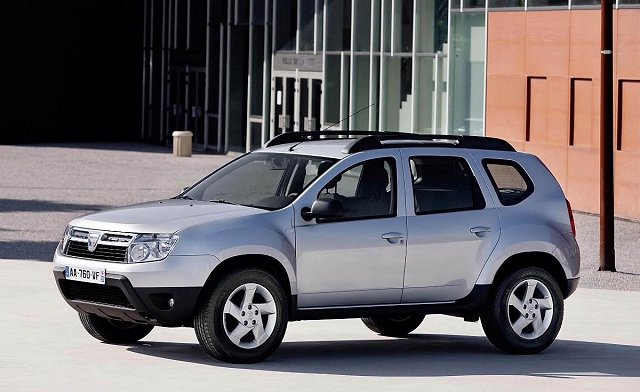With prices starting from €14,990 the Dacia Duster looks like it could be a game-changer in the Irish market - it just has to convince Irish buyers to take a chance on an unknown brand first.
In the metal 3/5
There is no real way around it - the Duster is not conventionally good looking, but the crossover segment is full of vehicles like the Nissan Qashqai and Skoda Yeti that, while unlikely to win beauty contests, still sell well.
High ground clearance and muscular arches give the look of a car that could easily tackle the wilds of The Burren, but try as Dacia might the natural habitat of the Duster will be the urban jungle and it is the satin chrome additions and 16-inch alloy wheels of the Signature trim line that suit this setting.
One of the big talking points before the launch of the Duster was how much Dacia would scrimp on interior fittings and quality to keep the price low and while there are some signs of corner cutting - centrally mounted controls for the rear windows to save on fitting separate units for instance - the quality of plastics used, while behind class leaders, is on par with rivals from the Far East. The cabin is functional, which is a polite way of saying spartan, so don't expect clever storage facilities or much in the way of luxury, but it is solidly built as evidenced by the fact that Dacia encouraged children to clamber all over it at the Irish launch.
Capable of carrying five with ease the Duster boasts a 475-litre boot that can grow to 1,636 litres with the rear seats folded.
Driving it 4/5
Dacia is keen to highlight the Duster's off-road capabilities and so the test route comprised of a purpose designed off-road course with a quick spin down a country lane - not enough to truly determine how it will handle the rough and tumble of Irish roads.
What we could ascertain was that the Duster, having proved itself competent on the off-road section, had no problem negotiating the pothole strewn bohreen with only larger imperfections and speed bumps upsetting the multilink suspension and entering the cabin.
Only one engine - a 1.5-litre dCi diesel unit - will be offered on the Irish market. Borrowed from parent company Renault, it is not overly blessed with grunt - offering 109hp and 240Nm of torque - but thanks to the Duster's low weight it never feels overwhelmed. The 12.5-second 0-100km/h time will not set the world alight but fuel consumption of 5.0 litres/100km (56.5mpg) and road tax of €225 per year are likely to be higher on the list of priorities for buyers than performance.
What you get for your money 5/5
Unlike the UK market, which will get three trim levels of the Duster, the Irish are restricted to two - Alternative and Signature. The good news is that the version we do without is the poverty-spec model that has no air conditioning, electric windows and even a radio. While the €14,990 Alternative model does have to make do with 16-inch steel wheels and manual windows in the back it still features central locking, front fog lights, a multi-function steering wheel, tinted windows, ISOFIX mounting points and a CD/radio with Bluetooth connectivity.
The volume seller is expected to be the range topping Signature line that adds 16-inch alloy wheels, air conditioning, a leather wrapped steering wheel and electric rear windows. The Signature 4x4 we tested will be the only variant available with a spare wheel and Electronic Stability Control (ESC).
Worth Noting
Set to arrive in January next year the Duster will be offered with a three-year, 100,000km warranty as standard, but this can be upped to a five-year, unlimited mileage warranty for €549. A special launch offer has also been put together by Dacia (Renault) Finance that will allow buyers to purchase a Duster for as little as €149 per month over three years.
Summary
Dacia is targeting family buyers who would traditionally have taken to the second hand market for their family cars. With prices starting 40 per cent lower than the top-selling Nissan Qashqai, proven mechanicals, low running costs and three-year warranty as standard the Duster has a lot going for it. Dacia just has to convince naturally conservative Irish buyers to plumb for the new brand from Romania.













